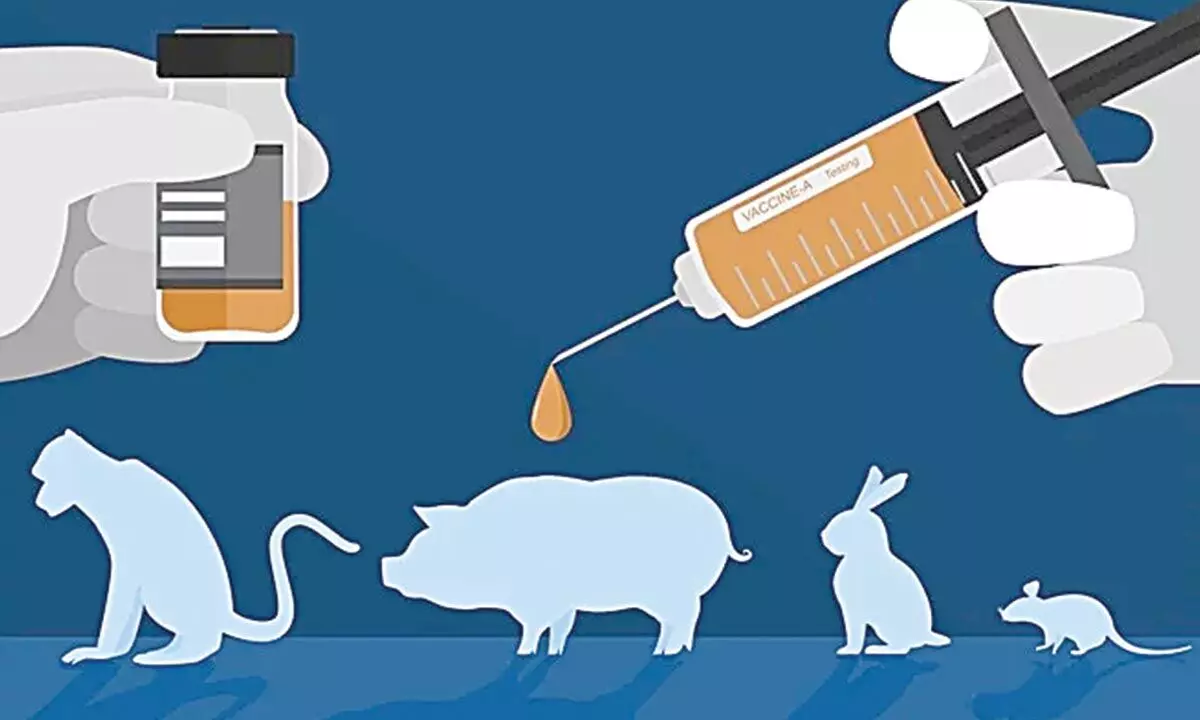Move to regulate experiments on animals a welcome decision
Tough laws can help CCSEA put an end to cruelty in labs and research centres
image for illustrative purpose

According to the draft and the final notification, the other functions of the committee include registration of establishments engaged in breeding of animals and conducting experiments on animals and renewal of registered establishments; constitution, re-constitution and revision of the Institutional Animal Ethics Committee (IAEC)
In what can prove to be a good move to regulate and monitor experiments on animals and prevent cruelty in the research facilities in medical and pharmacy colleges, pharma and vaccine industry in the country, the Union government has recently notified the administrative rules for the Committee for Control and Supervision of Experiments on Animals (CCSEA), which is the statutory committee to regulate and monitor experiments on animals.
Earlier on April 11, 2022, the Union Ministry of Fisheries, Animal Husbandry and Dairying had published the draft notification of the Committee for the Purpose of Control and Supervision of Experiments on Animals (CPCSEA) Administrative Rules, 2022. Now, the final notified Rules for CCSEA have provisions for deemed approval and grading of animal house facilities in medical colleges, pharmacy colleges, pharma and vaccine industry, among others. In addition to the functions assigned to the committee under the draft rules, the final notification ‘Administrative (Committee for Control and Supervision of Experiments on Animals) Rules, 2023’, mandates the committee to grade the animal house facilities purpose wise and categorically in medical colleges, pharmacy colleges, veterinary colleges, research institutes, pharma industry, vaccine industry and life sciences universities and others.
The notification also provides powers to the panel to revise the guidelines, their dissemination, implementation and monitoring and the responsibility to maintain a database on the available non-animal methods for experiments, teaching and training, which were not present in the draft notification.
According to the draft and the final notification, the other functions of the committee include registration of establishments engaged in breeding of animals and conducting experiments on animals and renewal of registered establishments; constitution, re-constitution and revision of Institutional Animal Ethics Committee (IAEC); approval of animal house facilities for small and large animals; examination of research protocols for experimentation on animals or pre-scrutinisation of research protocols on large animals and inspection of animal house facilities of establishments, institutes and centres where experimental animals are kept for research, production of biopharmaceuticals and breeding purposes.
That the government is concerned about the welfare of animals meant for experimentation in research institutions is clear from the fact that the committee has to advice the government regarding the welfare of animals meant for experimentation; to ensure implementation of rules and guidelines of the Committee made under the Prevention of Cruelty to Animal Act, 1960 (59 of 1960) for welfare of animals; analyse inspection reports submitted by the committee’s nominee and scrutinise the minutes of IAEC meeting; make efforts to tap more establishments housing laboratory animals and bring them under the ambit of the committee and any other work as per the mandate of the committee assigned as per the Act.
According to the timeline finalised under rules, the approval of registration and constitution of IAEC or amendment in registration has to be disposed of in seven working days; renewal or registration and re-constitution of the IAEC or its revision or change of nominee in three working days; pointing out deficiency and rejecting the protocol back to the organisation by the committee in three working days; evaluation of the protocol by sub-committee and forwarding to the committee for consideration has to be completed in seven working days from then.
Evaluation and decision on large animal research protocols, if all other prerequisites are fulfilled, have to be completed in 30 working days. The CCSEA has to hold committee meetings once in a month, ordinarily at the headquarters in Delhi. The timelines are subject to submission of all the requisite details and documents by the establishments. As per the final notification, the proposals shall be considered deemed to be approved, if it is lying pending for more than a month even after completion of proposal in all respects or the committee did not deliberate on the proposal for one month.
The rules also elaborate on funding and other administrative matters. While the draft notification had allowed committee’s funds from grants made by the government and of contributions, donations, subscriptions, bequests, gifts and the likes made to it by any person, the final notification adds that such funding “by any person except from individuals or parties with any potential bias or stake in its decisions, including any one or any group that uses animals for experiments or teaching or training purposes”. Certainly, the final notified rules for CCSEA will prove to be beneficial for the deemed approval and grading of animal house facilities in medical colleges, pharmacy colleges, pharma and vaccine industries in the country.
(The author is freelance journalist with varied experience in different fields)

